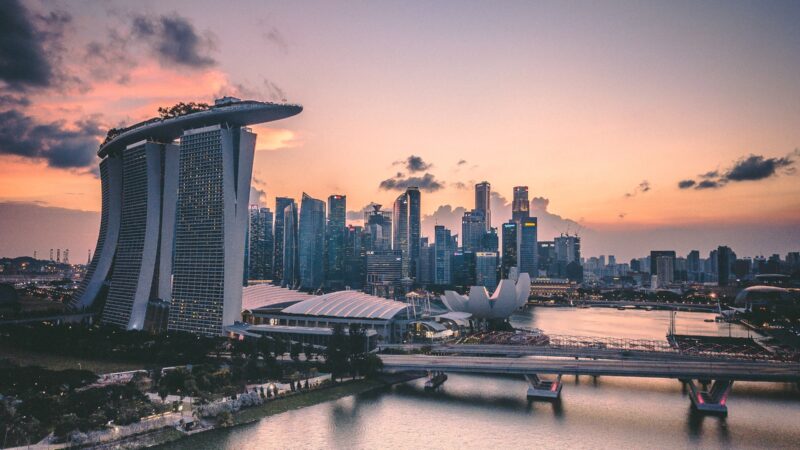The Century of Steel
Imagine a world in which there is no central structure, imagine a world where both the United States and China have fallen from a state of global hegemony to struggling to maintain any internal resemblance of order. This could occur independently of the other nation’s collapse or in tandem with it. What would the world look like? Would another world order emerge or would complete anarchy befall the world writ large? If there isn’t the time or conditions for another unipolar nation to fill this void, in part or in full, we must look for a more divided and unstable world structure. This core concept can be understood as non-polarity, where states cannot order themselves according to any traditional structure. Out of this concept, we could be entering a world of widespread turmoil and interstate violence. This can be understood as the Century of Steel (CoS), a term to help describe and articulate what we could be going through.
In order to understand the CoS, we first must look at Italian politics in the postwar years. The Years of Lead refers to a period of widespread social and political instability and violence in Italy. This period saw terrorism and assassinations become normalised from the 1960s to 1980s, the outcome of which saw government forces triumph and various far-right and far-left organisations disbanded. Notable and symbolic examples of this period include the Bologna Bombing in 1980 and the assassination of former Italian prime minister Aldo Moro. A lengthy explanation of this period can be found here.
Now, imagine a globalised version of the Italian Years of Lead taking place through a deglobalising world. Widespread interstate turmoil across nearly all regions of the world could occur. Following this, in the wake of the Coronavirus pandemic, we have seen the rise of old tensions occur once more from across the Eurasian Steppe and the Middle East. From the ‘Special Military Operation’ in Ukraine to the thinning of the Palestinian herd by Israel. The outcomes of this will look like Russia beating Ukraine, with them annexing half the country, followed by Israel becoming a pariah within the Middle East again, ending decades of peace efforts. With the collapse of the current ‘rules-based’ world order and the potential joint collapse of both major superpowers in the not-so-distant future, another avenue of what could happen needs to be explored.
One of the most underrated academics currently working is that of Yi Fuxian, who has contributed considerably to the topic of demography, especially within the context of the Asia-Pacific. In a recent Diplomat article, Yi argued that any conflict will only exacerbate the ongoing demographic issues between the aforementioned warring nations. As noted with the ongoing Russo-Ukrainian War, both nations have seen their respective fertility rates drop substantially. Likewise, if war were to break out between China and Taiwan (both nations are in considerably worse demographic situations), this would have disastrous consequences for both nations, regardless of the outcome of the conflict.
“If a Taiwan war breaks out, it will hasten these trends, leading to global instability and even the collapse of the U.S.-led world order… Time is not on the side of China or Taiwan, nor on the side of the United States. The three parties need to show sufficient wisdom and courage to achieve permanent peace across the Taiwan Strait – and avoid dropping off a demographic cliff.”
-Yi Fuxian, The Demographic Costs of a War Over Taiwan, The Diplomat (10/04/2024)
With most of the world now residing in a ‘post-fertile’ world, being below replacement level, there are fewer ‘new’ people entering into this increasingly conflictual world. What a lot of nations have now in terms of manpower is all they will have for many years to come, and when it goes, it goes. If you choose to spend it on conflict, you must accept the fact you will most likely not have anyone to replace them, creating various problems down the line. Moreover, the potential conflicts will only further perpetuate the conditions that caused states to fall into such a demographic rut in the first place.
If we are indeed becoming truly deglobalised, we could see the emergence of a new epoch. Just as the Cold War defined much of the 20th Century, the CoS may define much of the 21st. A ‘century’ of no centralised control being exerted within the world, incapable of regulating and mediating beyond a very narrow and constricted sphere of influence. This will only compound the ongoing issues being faced across the planet. We are entering very dangerous and complex times ahead for every single individual in the world and more conflicts will most likely arise in the following years as a result.










The Impossible as Motivation
Like all disaffected individuals who supported the Conservatives in 2019, I too find solace in the work of a certain Italian Marxist philosopher and his insights. The simplicity of that quote often speaks to a dormant impulse in the human condition, the belief that things really can change; that, when everything is said and done, we will win. We must, as President Trump once said: “…treat the word ‘impossible’ as motivation.”
In the history of Great Britain, this nation has faced many challenges and many dark days. Those dark days still lay ahead, for that can be assured. Those obstacles within our national politics seem numerous: civil servants, fifth columnists, various media establishments and even entire political parties which claim to represent the interests of the country. Out of this election, it is plain as day. Labour will win, through sheer dullness and the fact that Sunak has clearly given up and not even attempted to try during this race for his own premiership. The reason why people do not like Sunak is because, at his core, he represents ultimately why people do not like Conservatives or politicians in general. They are mostly losers who want to be liked and be seen as important by others; they want to be winner but have never fought truly for anything in their lives. It is for this reason, they are not worthy of any votes or seats. It is not because they have fought and failed, it is that they have never even tried or put up a fight.
From this, the only cure that needs to be given is that of Zero Votes and Zero Seats. Vote Reform now, Cummings later. This can be summarised as voting Reform now to give the Conservatives zero seats, thus ending them (at least, as much as possible) as a political force within Great Britain. Out of this, we should unite around a different right-wing party, one that genuinely seeks to change the direction of the country and prepared to ask and answer the questions that matter. Why are we having these problems? Why are people struggling to buy a house? Why is this country declining?
Following on from this, it is clear that Farage is here to stay and can become a massive nuisance for the administrative state, the state that is allergic to change and remains prestige-orientated. As such, Farage is not the man who will do these things; he is a media personality, not someone who is interested in the nitty gritty of continuing (starting with Brexit) a decade-long (if not century-long) process of fixing the foundational issues of this country. Farage is an Einstein in an Oppenheimer world, it would seem.
Farage understands the need for generating a new excitement around a political issue, he understands that nothing is impossible, even that the mere usage of the word should be taken as motivation. Indeed, his lifelong struggle to get Britain to leave the EU is one such endeavour which, even at the best of times, felt like an ultimately impossible task until it wasn’t. This is not dissimilar to Trump, a figure who isn’t sensitive to the nuance of details, but fundamentally understands the broad picture, why things needs to change, and how to go about doing it.
As such, one hopes that if Reform becomes akin to UKIP, they can become a political force that asks the big questions that the majority of the population want asked. Additionally, Reform should be able to shift the Overton window on a series of issues, bringing them to the forefront of politics from outside of the mainstream political parties. These should range from immigration, the economy, the housing crisis, and the need to dismantle the administrative state.
This being said, like UKIP and the Brexit Party before, when Reform has kicked through the door, it should again vanish. By the end of the decade, Reform should be as important as UKIP is in 2024. Reform should not be here to stay in the long term. Now that it seems possible that Reform will replace the Conservatives, just as the Labour replaced the Liberals throughout the 1920s, allowing them to fully turn their guns on Labour, exposing them as being no better. Of course, Labour is not up to the task of governing and will almost certainly do damage to Britain. Given that Starmer is a wet lettuce of a man, unlikely to last long in post, they’ll have plenty of material to work with.
From this, Reform can generate space for something to be built for the 21st Century, something with real long term vision and purpose. Insert “assorted weirdos” reference here. Indeed, it is rather fitting that the two individuals that are attempting to offer real alternatives to the current issues facing this country are the same two which brought Brexit home (twice if you count the 2019 general election). Now we could realistically see this occur again. Farage’s media personality pushing the core issues into the forefront of British political life, while Cummings dominates the nitty gritty of how to get from ‘A’ to ‘B’ and securing the real victories. Additionally, both men want the complete destruction of the gate keeping Conservatives and are radically anti-establishment and Westminster, something the vast majority of the electorate share.
Although Cummings has modelled his work on Singapore’s People’s Action Party (I would encourage all to read ‘From Third World to First: The Singapore Story: 1965-2000’), and its stewardship under Lee Kuan Yew, it is another Southeast Asian leader that he should also look at too. Ho Chi Minh (hear me out), and his leadership of North Vietnam, can be summarised as that of revolutionary self-belief and determination. The clinical and principled nature of Singapore, combined with the zealous optimism of Vietnam, would propel the country back into a forward-thinking, functioning 21st Century nation state. It should be hoped that, when Cumming’s Party is ready and the door has been blown open by Farage’s Reform, it too should move into place. A tech-focused, big tent, anti-establishment party that seeks to radically fix the core issues within the country. Radically reduce immigration, tackle the wealth disparity and tax avoidance, and dismantle the permanent administrative state.
In conclusion, Politics is Never Over. Things have returned to being interesting – we could witness another realignment in our national discourse. This should be motivating for people like Farage and Cummings. We can smell blood right now on both Starmer and Sunak, so we must take this chance to end the declinist duopoly once and for all, and scramble to build something in its place thereafter. As Farage stated in a mere four words: “We’re just getting started.”
Photo Credit.